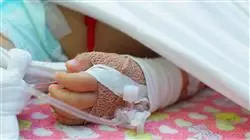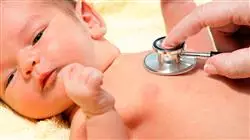University certificate
The world's largest faculty of nursing”
Introduction to the Program
It is necessary to train nursing professionals to acquire the knowledge, skills and attitudes that will enable them to approach and manage children in emergency situations in all their dimensions and at all levels of care"

Children represent one of the most vulnerable groups in terms of morbidity and mortality, naturally due to the special conditions in which they find themselves during the perinatal stage and infancy, related to the biological processes of reproduction, growth and development.
In addition to prevention and family education, emergency care is paramount to maintaining the health status of children, and both emergency departments and the professionals who work in them play a key role in urgent pediatric care.
In addition to their general training, nursing professionals who perform their care function in pediatric patient care services must have acquired the necessary knowledge and skills for their daily practice with Critically Ill Pediatric Patients, and it is essential to update this knowledge and skills through adapted training programs.
The Postgraduate diploma in Vital Pediatric Emergencies for Nursing is designed to enable nursing professionals to incorporate the advances that are taking place in the discipline, in addition to reviewing the most important aspects of emergency care for pediatric patients and their care.
The Postgraduate diploma in Vital Pediatric Emergencies for Nursing contains the most complete and updated scientific program on the market"
With a duration of 6 months, this Postgraduate diploma is designed by a teaching staff with extensive experience and recognized prestige in pediatrics and the area of emergencies and emergencies in children, whose highlights are:
- Structured in 5 modules and 25 lessons
- Clinical cases presented by experts. The graphic, schematic, and eminently practical contents with which they are created provide scientific and practical information on the disciplines that are essential for professional practice
- New diagnostic and therapeutic developments in caring for children. Includes pediatric triage in nursing
- Specific sections in each module on nursing techniques and procedures according to the age of the child: airway aspiration, electrical cardioversion, transcutaneous pacemaker, lumbar puncture, etc.). Management of pediatric arrhythmias, based on the latest ILCOR 2015 recommendations
- Video lessons on different pathologies and how to approach them
- Algorithm-based interactive learning system for decision-making in the presented clinical situations
- Theoretical lessons, questions to the expert, debate forums on controversial topics, and individual reflection assignments
- Content that is accessible from any fixed or portable device with an Internet connection
This Postgraduate diploma may be the best investment you can make in the selection of a refresher program for two reasons: in addition to updating your knowledge in vital pediatric emergencies, you will obtain a Postgraduate diploma from TECH Global University"
It includes in its teaching staff expert nurses and pediatricians of reference, who pour into this training the experience of their work, in addition to other professionals specializing in different areas of care for children and their families.
The multimedia content developed with the latest educational technology will provide the professional with situated and contextual learning, i.e., a simulated environment that will provide immersive training program to train in real situations.
The design of the program is based on Problem-Based Learning, by means of which the nursing professional must try to solve the different professional practice situations that arise throughout the program. For this reason, you will be assisted by an innovative, interactive video system created by renowned and experienced experts in pediatric emergencies with extensive teaching experience.
It includes clinical cases in real simulation situations to bring the program as close as possible to nursing practice"

Don't miss the opportunity to update your knowledge in Frequent Pediatric Emergencies to increase the quality of your care"
Why study at TECH?
TECH is the world’s largest online university. With an impressive catalog of more than 14,000 university programs available in 11 languages, it is positioned as a leader in employability, with a 99% job placement rate. In addition, it relies on an enormous faculty of more than 6,000 professors of the highest international renown.

Study at the world's largest online university and guarantee your professional success. The future starts at TECH”
The world’s best online university according to FORBES
The prestigious Forbes magazine, specialized in business and finance, has highlighted TECH as “the world's best online university” This is what they have recently stated in an article in their digital edition in which they echo the success story of this institution, “thanks to the academic offer it provides, the selection of its teaching staff, and an innovative learning method aimed at educating the professionals of the future”
A revolutionary study method, a cutting-edge faculty and a practical focus: the key to TECH's success.
The most complete study plans on the university scene
TECH offers the most complete study plans on the university scene, with syllabuses that cover fundamental concepts and, at the same time, the main scientific advances in their specific scientific areas. In addition, these programs are continuously being updated to guarantee students the academic vanguard and the most in-demand professional skills. In this way, the university's qualifications provide its graduates with a significant advantage to propel their careers to success.
TECH offers the most comprehensive and intensive study plans on the current university scene.
A world-class teaching staff
TECH's teaching staff is made up of more than 6,000 professors with the highest international recognition. Professors, researchers and top executives of multinational companies, including Isaiah Covington, performance coach of the Boston Celtics; Magda Romanska, principal investigator at Harvard MetaLAB; Ignacio Wistumba, chairman of the department of translational molecular pathology at MD Anderson Cancer Center; and D.W. Pine, creative director of TIME magazine, among others.
Internationally renowned experts, specialized in different branches of Health, Technology, Communication and Business, form part of the TECH faculty.
A unique learning method
TECH is the first university to use Relearning in all its programs. It is the best online learning methodology, accredited with international teaching quality certifications, provided by prestigious educational agencies. In addition, this disruptive educational model is complemented with the “Case Method”, thereby setting up a unique online teaching strategy. Innovative teaching resources are also implemented, including detailed videos, infographics and interactive summaries.
TECH combines Relearning and the Case Method in all its university programs to guarantee excellent theoretical and practical learning, studying whenever and wherever you want.
The world's largest online university
TECH is the world’s largest online university. We are the largest educational institution, with the best and widest online educational catalog, one hundred percent online and covering the vast majority of areas of knowledge. We offer a large selection of our own degrees and accredited online undergraduate and postgraduate degrees. In total, more than 14,000 university degrees, in eleven different languages, make us the largest educational largest in the world.
TECH has the world's most extensive catalog of academic and official programs, available in more than 11 languages.
Google Premier Partner
The American technology giant has awarded TECH the Google Google Premier Partner badge. This award, which is only available to 3% of the world's companies, highlights the efficient, flexible and tailored experience that this university provides to students. The recognition as a Google Premier Partner not only accredits the maximum rigor, performance and investment in TECH's digital infrastructures, but also places this university as one of the world's leading technology companies.
Google has positioned TECH in the top 3% of the world's most important technology companies by awarding it its Google Premier Partner badge.
The official online university of the NBA
TECH is the official online university of the NBA. Thanks to our agreement with the biggest league in basketball, we offer our students exclusive university programs, as well as a wide variety of educational resources focused on the business of the league and other areas of the sports industry. Each program is made up of a uniquely designed syllabus and features exceptional guest hosts: professionals with a distinguished sports background who will offer their expertise on the most relevant topics.
TECH has been selected by the NBA, the world's top basketball league, as its official online university.
The top-rated university by its students
Students have positioned TECH as the world's top-rated university on the main review websites, with a highest rating of 4.9 out of 5, obtained from more than 1,000 reviews. These results consolidate TECH as the benchmark university institution at an international level, reflecting the excellence and positive impact of its educational model.” reflecting the excellence and positive impact of its educational model.”
TECH is the world’s top-rated university by its students.
Leaders in employability
TECH has managed to become the leading university in employability. 99% of its students obtain jobs in the academic field they have studied, within one year of completing any of the university's programs. A similar number achieve immediate career enhancement. All this thanks to a study methodology that bases its effectiveness on the acquisition of practical skills, which are absolutely necessary for professional development.
99% of TECH graduates find a job within a year of completing their studies.
Postgraduate Diploma in Pediatric Vital Emergency Care for Nursing
Pediatric emergency care is a crucial and highly specialized task that requires highly trained professionals. Children are especially vulnerable to illness and injury, so urgent, quality care is critical to maintaining their health status.That is why the Postgraduate Diploma in Pediatric Vital Emergencies for Nursing has been created, a program designed to prepare nursing professionals in the latest techniques and best practices in the care of pediatric patients in emergency situations.This training program is aimed at nurses who work in pediatric emergency departments, as well as those who wish to specialize in this field. The Postgraduate Certificate focuses on the acquisition of key knowledge and skills for the management of emergency situations, such as the recognition and treatment of common injuries and illnesses in children, as well as the care of critically ill patients.
Update your knowledge in Emergency Pediatrics
Students in the Postgraduate Diploma in Pediatric Emergency Life Support for Nursing will also learn about the importance of effective communication and teamwork in emergency situations, and how to manage stress and pressure in these situations.The training in this course is taught by experts in the field of pediatrics and emergency care, who will share their knowledge and practical experience with students. In addition, the program uses advanced teaching technologies to ensure an effective and engaging learning experience.In summary, the Postgraduate Diploma in Pediatric Life Emergency Care for Nursing is an excellent opportunity for nursing professionals to improve their skills and knowledge in the emergency care of pediatric patients. With this Postgraduate Certificate, students will be better prepared to provide the necessary care in critical situations, which can make a difference in the health and well-being of children.







